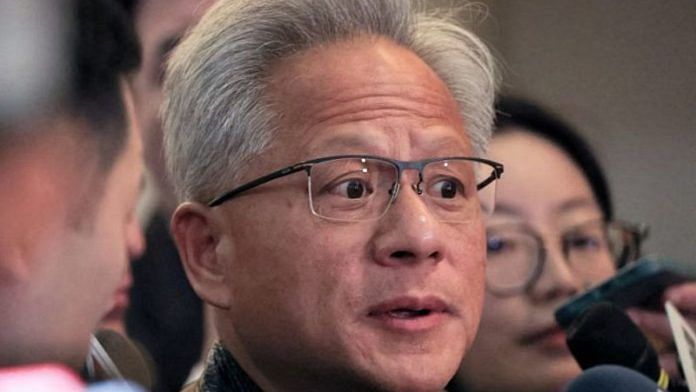Nvidia founder and CEO Jensen Huang’s visit to Beijing last month, along with the US approval for H20 chips exports, appeared to signal continued cooperation and a commitment to global technological interdependence. But in China, the reaction was markedly different— scepticism, mistrust, and a growing call for technological self-reliance.
From Beijing’s viewpoint, this was no act of goodwill but a strategic move to maintain American influence over China’s tech ecosystem. Huang publicly praised China’s innovation and dismissed the idea of full decoupling as unrealistic during his appearance on China Central Television’s Face to Face. But the conversation moved beyond his reassurances to focus on a more urgent concern: the risks posed by reliance on foreign technology in critical infrastructure.
Autonomy over access
Central to the discourse is a pressing question: can China trust American technology, especially when there is a growing perception that US export laws may allow for hidden control mechanisms in restricted products?
On 31 July, China’s Cyberspace Administration summoned Nvidia amid suspicions that the H20 chip contained backdoors, including GPS tracking, unauthorised data access, and remote shutdown capabilities. On 1 August, People’s Daily editorial warned that US-made chips might carry covert features jeopardising national security. Online discussions quickly evolved from technical details into broader political mistrust.
Trust in the H20 chips is eroding fast. Nvidia may lead globally, but it remains a US company, bound by American laws like the CHIPS and Science Act. For many in China, that alone makes its products unreliable—‘If a chip must follow US rules, it cannot be trusted’.
One commentator likened the embargo lift to buying a lock while the seller keeps the master key, a vivid metaphor for mistrust and fear that technological dependence could become a strategic trap.
Chinese analysts have long accused the US of technological duplicity, undermining companies like Huawei on national security grounds while exporting its own surveillance-capable hardware. As one observer put it, “the thief shouting to catch the thief.”
Shen Yi, professor at Fudan University, argued that reliance on American technology is unwise and strategically perilous for China. Across platforms like Weibo, the consensus is that foreign technology can be disabled, manipulated, or weaponised. Autonomy remains the only true safeguard.
This view is expressed in a trending Weibo hashtag, #US resumes sales in H20 or delays China’s chip development. One widely-discussed post on the microblogging site claims that Washington lifted the ban only as Chinese firms approach breakthroughs, flooding the market with cheaper alternatives to squeeze profits and undermine local innovation. The post calls for retaliatory tariffs and stronger State support to protect domestic companies from what it describes as deliberate suppression.
Another Weibo user captured the dominant sentiment, warning that China’s expanding AI chip capacity threatens to render Nvidia’s H20 stockpiles obsolete. The post called for allowing previously banned chips while restricting those approved by Washington. Administrative protection, they insisted, is essential for long-term resilience.
Hu Xijin, former editor-in-chief, Global Times, also dismissed the return of the H20 chip as a gesture of US generosity. Instead, he sees it as a direct response to the growing strength of Chinese tech companies like Huawei and the pressure they exert.
Viewed through this lens, easing restrictions is no olive branch. It is a tactical US manoeuvre designed to prolong China’s tech dependence, suppress momentum, and preserve an uneven grip on vital infrastructure.
Also read: US lawmakers push for Chip Security Act to stop China from using American AI microchips
Strategic pivot to self-reliance
The Nvidia episode has reignited the longstanding imperative to break dependence and secure technological autonomy. Across Chinese online platforms, the call for digital sovereignty as a national necessity is growing louder.
Ni Guangnan, senior academician at the Chinese Academy of Sciences, has warned that unless China controls the entire semiconductor chain, from EDA software to photoresist, foreign concessions will be short-lived. Real security, he argued, lies in self-reliance.
Chinese commentary stresses that effective measures are essential to safeguard national interests. Imported chips must now be fully traceable to their origin, a crucial step to prevent hidden vulnerabilities. The 125 per cent tariff on US semiconductors sends a clear message that market access is no longer unconditional, and attempts to bypass these controls through third countries will be systematically blocked.
For Nvidia, the stakes are rising. China remains a vital market, especially for AI chips, but mere presence no longer guarantees influence or greater access. Proving credibility and accepting business on Chinese terms will prove tricky.
Meanwhile, Chinese firms are making significant progress. Beyond China’s borders, other countries, such as India, which is shaping its own semiconductor strategy, are drawing both lessons and caution from Beijing’s trajectory. What began as a bilateral standoff has evolved into a global contest over technological sovereignty.
Chips are increasingly seen as strategic assets. And, Beijing is moving swiftly toward self-sufficiency and technological resilience.
Sana Hashmi is a fellow at the Taiwan-Asia Exchange Foundation. She tweets @sanahashmi1. Views are personal.
(Edited by Ratan Priya)





